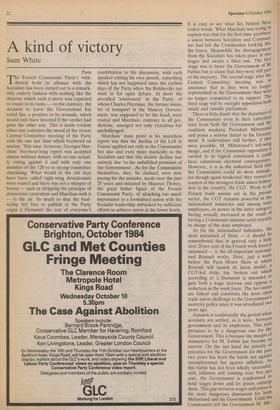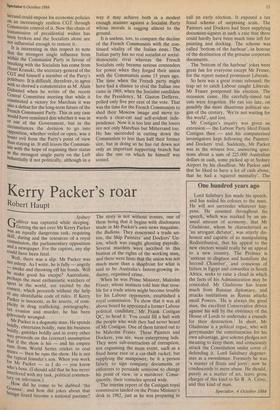A kind of victory
Sam White
Paris rr he French Communist Party's with- drawal from its alliance with the Socialists has been carried out in a remark- ably orderly fashion with nothing like the disarray which such a move was expected to create in its ranks — on the contrary, the decision to leave the Government has acted like a poultice to its wounds, which would only have festered if the verdict had gone the other way. This is made evident when one contrasts the mood of the recent Central Committee meeting of the Party with the one last June which bordered on mutiny. This time, however, Georges Mar- chais' five-hour-long report was accepted almost without demur, with no one actual- ly voting against it and with only one member of the 120 or so strong committee abstaining. What would in the old days have been called right-wing deviationists were routed and there was not a whisper of heresy — such as dropping the principle of democratic centralism and Marchais with it — in the air. So much so that the lead- ership felt free to publish in the Party organ L'Humanite the text of everyone's contribution to the discussion, with each speaker editing his own speech, something which has not happened since the earliest days of the Party when the Bolsheviks too went in for open debate. In short the so-called 'renovators' in the Party, of whom Charles Fiterman, the former minis-. ter of transport in the Mauroy Govern- ment, was supposed to be the head, were routed and Marchais, contrary to all pre- dictions, emerged not only victorious but unchallenged.
Marchais' main point in his marathon report was that the decline of the Left in France applied not only to the Communists but also and even more markedly to the Socialists and that this double decline was entirely due 'to the unfulfilled promises of the Government'. As for the Communists themselves, they, he claimed, were now paying for the mistake, made over the past 20 years and initiated by Maurice Thorez, the great father figure of the French Communist Party, of attaching too much importance to a formalised union with the Socialist leadership unbacked by sufficient efforts to achieve union at the lower levels.
It is easy to see what lies behind these coded words. What Marchais was trying to explain was that for the first time anywhere a union between Socialists and Commun- ists had left the Communists looking like the losers. Meanwhile the disengagement from the Socialists has taken place in two stages and awaits a third one. The first stage was to leave the Government of M. Fabius but to claim that they were still part of the majority. The second stage after the Central Committee meeting was to announce that as they were no longer represented in the Government they were no longer committed to its support. The third stage will be outright opposition both inside and outside parliament. There is little doubt that the departure of the Communists even in their enfeebled state from both the Government and the coalition weakens President Mitterrand and poses a serious threat to his Govern- ment. It undermines still further, if that were possible. M. Mitterrand's left-wing image, and if the Communist opposition is carried to its logical conclusion it could „ have calamitous electoral consequences. However, it is in the industrial field that the Communists could do most damage, for though again weakened they remain in control of the strongest trade union federa- tion in the country, the CGT. Weak as all French trade unions are in the private sector, the CGT remains powerful in the nationalised industries and among state employees, its power in the latter category having actually increased as the result of having a Communist minister until recently in charge of the state employed. As for the nationalised industries, the most unionised of these — it should be remembered that in general only a little over 20 per cent of the French work force is unionised — is the all-important national- ised Renault works. Here, just a week before the Paris Motor Show at which Renault will launch its latest model, a CGT-led strike has broken out which according to L'Humanite is intended to gain both a wage increase and oppose reduction in the work force. The two issues are linked and constitute the most open trade union challenge to the Government's austerity policy since it was introduced tw° years ago. Autumn is traditionally the period when accounts are settled, as it were, between government and its employees. This year promises to be a dangerous one for the Government. This is because the margin of manoeuvre for M. Fabius has become s°, narrow. On the one hand the priority 01 priorities for the Government for the past two years has been the battle not against unemployment but against inflation. AS this battle has not been wholly successful, with inflation still running over five per cent, the Government is condemned to hold wages down and let prices outstrip them. This gap between wages and prices is the most dangerous dimension for both Mitterrand and his Government. Until the Communists left the Government M. Mit- terrand could impose his economic policies on an increasingly restless CGT through Communist control of it. Now this chain of transmission of presidential wishes has been broken and the Socialists alone are not influential enough to restore it. It is interesting in this respect to note that the strongest single influence from Within the Communist Party in favour of breaking with the Socialists has come from Henri Krasuki, the secretary-general of the CGT and himself a member of the Party's Politburo. It is difficult, therefore to agree with so shrewd a commentator as M. Alain Duhamel when he writes of the recent Central Committee meeting that while it constituted a victory for Marchais it was also a defeat for the long-term future of the French Communist Party. This in any case would have remiined dim whether it was in or out of the Government, but in the circumstances the decision to go into °PPosition, whether veiled or open, was a lesser evil from the Party's point of view than staying in. It still leaves the Commun- ists with the hope of regaining their status as the strongest single party on the Left industrially if not politically, although in a way it may achieve both in a modest enough manner against a Socialist Party whose morale is sagging almost to the ground.
It is useless, too, to compare the decline of the French Communists with the con- tinued vitality of the Italian ones. The• Italian party has no real socialist or social- democratic rival whereas the French Socialists only became serious contenders for power when they forged their union with the Communists some 15 years ago. The time when the French party might have had a chance to rival the Italian one came in 1969, when the Socialist candidate for the Presidency, M. Gaston Defferre, polled only five per cent of the vote. That was the time for the French Communists to shed their Moscow image and move to- wards a clear-cut and self-evident inde- pendence. Now it is too late and the losers are not only Marchais but Mitterrand too. He has succeeded in cutting down the Communists to less than half their former size, but in doing so he has cut down not only an important supporting branch but also the one on which he himself was seated.















































 Previous page
Previous page